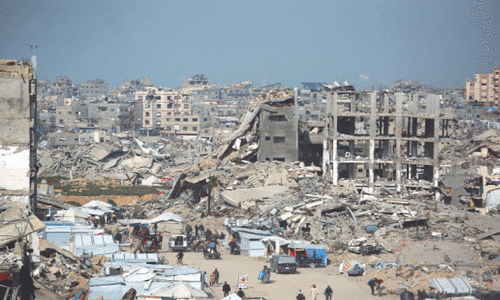I will never forget the memorable radio broadcast by Lord Mountbatten, on June 3, announcing that Pakistan would emerge as an independent and sovereign country on August 14, 1947.
My family had arrived in Abbottabad from Peshawar for the summer months, as we did every year. But the electricity connection for the house we had rented, had not yet been provided.
Therefore, mummy, Nisar and I took our radio to a neighbouring house and sought permission to listen to the leaders' speeches.
They readily agreed. Lord Mountbatten was followed by Pandit Jawaharlal Nehru, Quaid-i-Azam Mohammad Ali Jinnah and Sardar Baldev Singh. Quaid-i-Azam ended his speech with a forceful 'Pakistan Zindabad', starting waves of applause, wherever it was heard.
But as these speeches were dissected, a serious issue that was yet to be decided raised its head — the future of NWFP.
The Muslim League had won majority seats in all the Muslim majority provinces of India, except NWFP where it had won only 45 per cent of the seats. It would therefore be necessary, the British authorities decided, to hold a referendum in NWFP (as also in the Sylhet district of Assam plus a jirga of sardars in Balochistan) to determine if the people would vote to join Pakistan or India.
The referendum was to be held in July. The next day, I arrived at the district headquarters of the Muslim League located in Springfield Hotel, Abbottabad. Baba Jalaluddin (affectionately called Jalal Baba) was the district president and Ghulam Hussain the general secretary.
They were delighted because dozens of letters seeking information, instructions, or help were pending action in Ghulam Hussain's office. I cleared them within a few days. Fortunately, the Red Shirt party (later National Awami Party) boycotted the referendum and more than 90 per cent of the votes cast were in favour of Pakistan.
But the success of the referendum was marred by great disappointment over the Boundary Commission award under Sir Cyril Radcliffe. Gurdaspur, which was a Muslim majority district, was given to India. That provided a land route between India and Kashmir and became the root cause of the major dispute between India and Pakistan over Kashmir for the coming decades.
The historic day of August 14, 1947 has left a lasting imprint on my mind. We spent the whole day distributing green flags and earthen oil lamps to as many houses as possible.
The formal ceremony for hoisting the Pakistan flag was to be held in Company Bagh, Abbottabad, where the British deputy commissioner was to take the salute from a contingent of the Muslim League national guards. I had one of my white summer suits dyed in green and merrily marched in front of the contingent. 'This deputy commissioner, who until yesterday was ordering lathi (baton) charge on our rallies, will be saluting our flag!' How could I miss the excitement of such an experience?
Before the end of August, I received a letter from Professor Hassan, the only Muslim faculty member of a Hailey College, urging me to return to college. The vice chancellor had assured him, he said, that if 35 new students joined in September, the college would begin its post-partition existence with 50 students.
We lobbied hard by addressing Friday gatherings in Government College and F.C. College and conveying Quaid-i-Azam's emphasis on commerce and industry. By mid September, we had managed 30 new admissions but what about the faculty? Professor Hasan finally arranged part-time faculty members.
Rahim Jan for accountancy, Professor Ziauddin for statistics, Professor Ataullah for economic history and Professor Nazar Mohammad for commercial law, and one full-time faculty member, Hashmi, for economics and marketing. Hashmi also became the hosted superintendent and eventually served as principal of the college.
Hashmi took over the entire old hosted for about 60 of his relatives from Agra, who had migrated to Pakistan and had nowhere to live.
Our life at Hailey College for the remaining two years was such a stark contrast to the first year. All the hustle and bustle created by 350 Hindu and Sikh students had gone and was replaced by the gloom and agony of millions of refugees who had poured into Lahore.














































